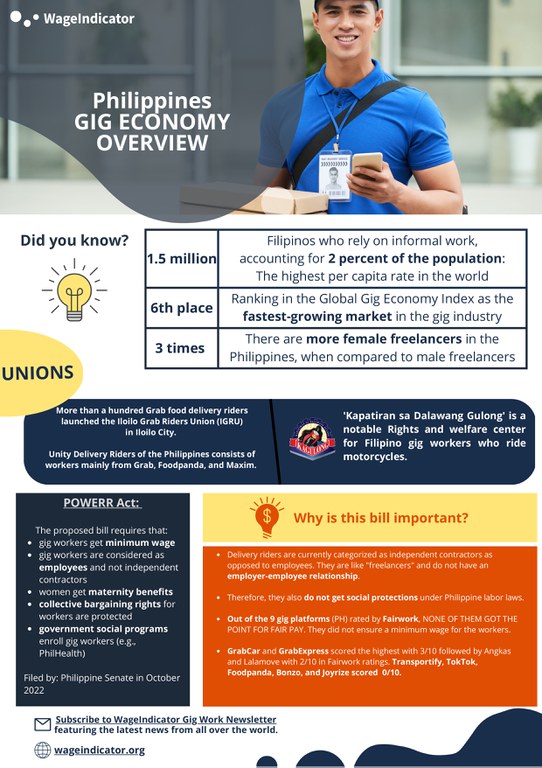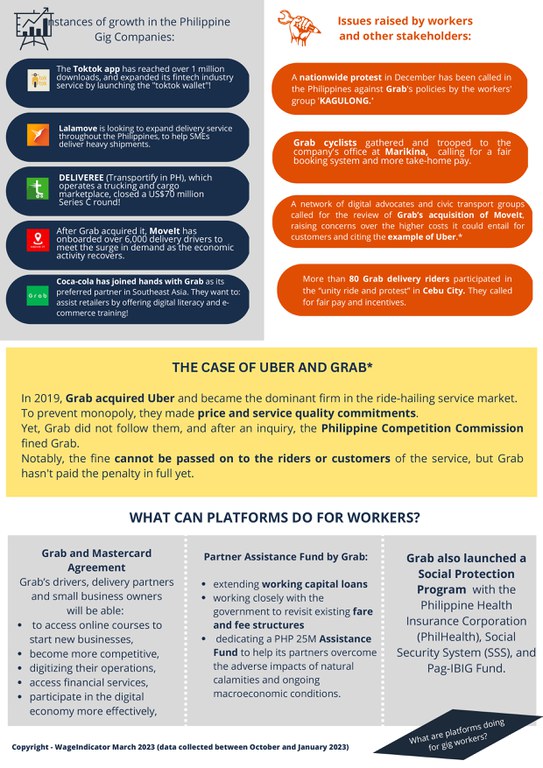TEXT FORMAT
1.5 million
Filipinos who rely on informal work, accounting for 2 percent of the population: The highest per capita rate in the world.
6th place
Ranking in the Global Gig Economy Index as the fastest-growing market in the gig industry.
3 times
There are more female freelancers in the Philippines when compared to male freelancers.
- More than a hundred Grab food delivery riders launched theIloilo Grab Riders Union (IGRU) in Iloilo City.
- Unity Delivery Riders of the Philippines consists of workers mainly from Grab, Foodpanda, and Maxim.
- 'Kapatiran sa Dalawang Gulong' is a notable Rights and welfare center for Filipino gig workers who ride motorcycles.
POWERR Act
The proposed bill requires that gig workers get minimum wage; gig workers are considered as employees and not independent contractors; women get maternity benefits; collective bargaining rights for workers are protected; government social programs enroll gig workers (e.g., PhilHealth) Filed by: Philippine Senate in October 2022
Why is this bill important?
Delivery riders are currently categorized as independent contractors as opposed to employees. They are like "freelancers" and do not have an employer-employee relationship.
Therefore, they do not get any social protections under Philippine labor laws.
Out of the 9 gig platforms (PH) rated by Fairwork, NONE OF THEM GOT THE POINT FOR FAIR PAY. They did not ensure a minimum wage for the workers.GrabCar and GrabExpress scored the highest with 3/10 followed by Angkas and Lalamove with 2/10 in Fairwork ratings. Transportify, TokTok, Foodpanda, Bonzo, and Joyrize scored 0/10.
Instances of growth in the Philippine Gig Companies:
- The Toktok app has reached over 1 million downloads and expanded its fintech industry service by launching the "toktok wallet"!
- Lalamove is looking to expand delivery service throughout the Philippines, significantly to help SMEs deliver heavy shipments.
- DELIVEREE (Transportify in PH), which operates a trucking and cargo marketplace, closed a US$70 million Series C round!
- After Grab acquired it, MoveIt has onboarded over 6,000 delivery drivers to meet the surge in demand as the economic activity recovers.
- Coca-cola has joined hands with Grab as its preferred partner in Southeast Asia. They want to assist retailers by offering digital literacy and e-commerce training!
Issues raised by workers and other stakeholders
- A nationwide protest has been called in the Philippines against Grab's policies by the workers' group 'KAGULONG.'
- Grab cyclists gathered and trooped to the company's office at Marikina, calling for a fair booking system and more take-home pay.
- A network of digital advocates and civic transport groups called for the review of Grab’s acquisition of MoveIt, raising concerns over the higher costs it could entail for customers and citing the example of Uber.*
- More than 80 Grab delivery riders participated in the “unity ride and protest” in Cebu City. They called for fair pay and incentives.
THE CASE OF UBER AND GRAB*
In 2019, Grab acquired Uber and became the dominant firm in the ride-hailing service market. To prevent monopoly, they made price and service quality commitments. Yet, Grab did not follow them, and after an inquiry, the Philippine Competition Commission fined Grab. Notably, the fine cannot be passed on to the riders or customers of the service, but Grab hasn't paid the penalty in full yet.
WHAT CAN PLATFORMS DO FOR WORKERS?
Grab and Mastercard Agreement
Grab’s drivers, delivery partners and small business owners will be able to access online courses to start new businesses, become more competitive, digitizing their operations, access financial services, and participate in the digital economy more effectively.
Partner Assistance Fund by Grab
- extending working capital loans
- working closely with the government to revisit existing fare and fee structures
- dedicating a PHP 25M Assistance Fund to help its partners overcome the adverse impacts of natural calamities and ongoing macroeconomic conditions.
Grab also launched a Social Protection Program with the Philippine Health Insurance Corporation (PhilHealth), Social Security System (SSS), and Pag-IBIG Fund.
Copyright - WageIndicator March 2023 (data collected between October 2022 and January 2023)


